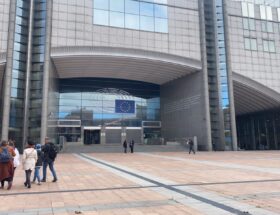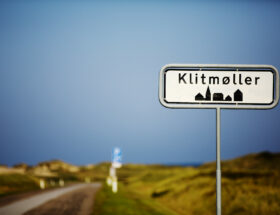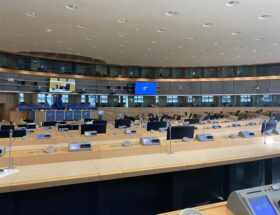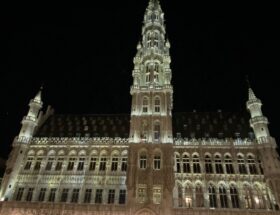“People, not ideology”. Rally in support of the LGBT+ community, in Warsaw, Poland, June 2021. CREDIT: Kacper Pempel
Differences between the European Union and member states Hungary and Poland threaten the rights of the LGBTIQ community, putting the relationship between these countries and Brussels into question.
Written by Itsaso Jauregui and Isla Storie
“I want to be crystal clear – LGBTQI-free zones are humanity-free zones. And they have no place in our Union.”
Such a declaration was made by Ursula von der Leyen, President of the European Commission, at her State of the Union Address in September 2020. Just one year prior to this, reports began to emerge of regions in Poland declaring themselves as free of “LGBT ideology”, a reflection of the country’s conservative religious values but out of alignment with the European Union’s values for equality.
These anti LGBT measures did not exclusively take place in Poland; they were also present in Hungary the following year. A new legislation was passed in Hungary which prohibited the access of content on topics including homosexuality and gender reassignment by people under the age of 18, with the alleged intention of protecting children.
The measures that these two countries have taken are in direct contrast to the new Equality Strategy published by the European Commission, which states that everybody in the European Union should be safe and free to be themselves and describes equality as a core value of the fundamental rights in the EU. It follows on from the Commission’s pledge on actions to advance LGBTI equality, the final report on which was published in 2019. The need for a focused strategy was called for by 19 member states and the European Parliament, supported by civil society and the European Parliament LGBTI Intergroup. It sets out a series of targeted actions, which will be integrated into all EU policies, legislation and funding, across four pillars. Miguel Chambel, coordinator of the LGBTI Intergroup, said: “The goal was to have a policy document that can guide the Commission in its efforts to streamline and mainstream LGBTI rights in the different areas where policies and legislation can affect LGBTI rights”. He went on to say that the strategy makes these rights a priority in the EU that cannot be questioned or denied.

Nevertheless, Hungary and Poland have decided to take another path away from these goals based on inclusiveness, creating a strained relationship with the European Union. Laurane De Graux, project manager and social worker at Brussels-based LGBTIQ association Tels Quels explained this distinction: “There is no transversal legislation in EU countries concerning the LGBTIQ+ community, apart from, perhaps, the Declaration of Human Rights. Each country decides whether or not it accepts and protects the community as it pleases. This is the reason why some European countries are still not safe for LGBTIQ+ people”. Therefore, being part of the community means to be isolated in a totally private environment since security is not guaranteed by the state to the ones who openly say or are seen as being part of the marginalized group.
However, LGBTIQ rights hasn’t been the only notion that has created division between Brussels and Warsaw. The difference in legislation between Poland and the European Union has caused a clash between them in the last few years and there has even been talk of Poland’s exit from the European Union. The legal order of the European Union is based on a transfer of legal sovereignty from the Member States, so when the Polish Constitution ruled that Polish laws and courts take precedence over European laws and courts the relationship between the European Union and the member state reached a critical point.
The situation became more tense when the Polish President, Andrzej Duda, declared that the promotion of LGBTIQ rights was “more destructive than communism”. In fact, his 2020 re-election campaign has seen nearly a third of Polish towns and regions pass resolutions against the community’s rights to become so-called “LGBT+ ideology-free zones”.
Moreover, 87% of the Polish population is affiliated with the Catholic Church, and as such, public perception and acceptance of the LGBT community are strongly influenced by Catholic moral doctrines. Vibe Termansen, a freelance journalist, LGBT+ activist and an Eastern European history expert analyzes the reasons for this hatred: “They are required to create fear and the community is their target. It’s a ‘threat’ to their idea of a Catholic and traditional family”. An example of this marginalization can be seen in the term “rainbow plague” that was used by the Archbishop of Krakow, Marek Jędraszewski, in a religious address.
This denial of rights and expression is also illustrated in a 2020 report by the European Union Agency for Fundamental Rights (FRA) titled A long way to go for LGBTI equality. Its purpose was to examine the issues of equal treatment and discrimination centered around gender identity and sexual orientation. This was achieved by presenting the findings from a 2019 survey of nearly 140,000 LGBTI people across all EU member states at the time, with consistently negative results recorded regarding Poland.

The relationship between Hungary and the EU was also impacted by anti-LGBTIQ decisions from its government but, like Poland, was already strained. It notably took a stance against the compulsory relocation of refugees during the 2015 migration crisis, which became a point of contention within the Union. In 2020, the Commission was also urged by press organisations to act on the Hungarian government’s alleged abuse of state aid to manipulate the media and reject press freedom in favour of government mouthpieces.
When it comes to the community’s rights they were especially questioned in January of 2021, when a children’s book published the previous year became the target of homophobic attacks by the government for having a diverse range of characters, including LGBTIQ people. The government ordered its publishers to print a disclaimer stating the content features “behaviour inconsistent with traditional gender roles”. The Commission became involved by sending Hungary a letter of formal notice due to its oppression of the rights to freedom of expression and non-discrimination as per the European Charter of Human Rights.
Such content was at the forefront of Hungary’s second infringement of LGBTIQ rights set out in legislation enforced in June 2021. In particular, it prohibits any content portraying homosexuality, gender reassignment or deviation of gender identity from sex at birth from being shown to anybody under the age of 18. This covers films, advertisements and educational content- sex education in schools will also be regulated in terms of how it is delivered and which subjects may be discussed. There was a failure to provide justification that these restrictions were necessary, non-discriminatory and would be in a child’s best interests.
The European Commission decided to intervene in July 2021 and launched infringement procedures against both member states. Essentially this is a statement with the aim of holding them responsible for fundamental rights, in response to not exclusively their actions, but governments in general pushing the boundaries of what is acceptable on grounds of human rights.
Different NGOs have spoken against the practices of these countries, like the Independent ILGA-Europe, who has been advocating at the highest European level for action to be taken against these countries for their denial of LGBTIQ rights and resultant societal division. Executive Director of ILGA-Europe Evelyne Paradis stated at the time: “EU member states can no longer act against human rights with impunity, nor can governments go on instrumentalising minorities for political gains. They have to and will be held accountable”. The streets have also been filled with citizens outraged by the decisions taken by the rulers of the above-mentioned countries. An example of this is the massive demonstration that took place in Warsaw, Poland, in June 2021, where Polish citizens claimed their rights before the European gaze. Therefore, in this tense atmosphere between Member States that do not respect the laws decreed by the European Union, freelance journalist Vibe Termansen would like to remind Brussels who are the ones really affected by the discriminatory measures: “The European Union must listen to the LGBTIQ collective and help NGOs who are risking their lives on the streets fighting for their rights. The heart of the matter is that, listen to those affected and act with their needs in mind”.








